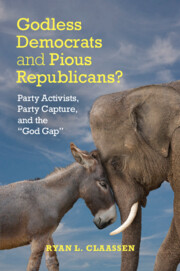Book contents
- Frontmatter
- Dedication
- Contents
- Figures
- Tables
- Acknowledgments
- Introduction
- 1 The Religious Divide in American Politics
- 2 Mobilization, Capture, and Misunderstood Trends
- 3 Representation and Four Forces that Shape Change Among Activists
- 4 First Force, The Effect of Being Fruitful and Multiplying
- 5 Second Force, The Effect of Voting Early and Often
- 6 Third Force, The Effect of Picking a Side
- 7 Fourth Force, The Effect of Writing Checks and Knocking on Doors
- 8 “Capture” Revisited, Representation, and Religious Activists
- 9 Conclusion
- Appendix A Coding for the Major Religious Traditions
- Appendix B Frequencies for Change Factor Computations
- Appendix C The Raw Materials for Assessing the Role of Demographic Change in the Activist Pools
- Appendix D Voter Loyalty Trend Estimates with Additional Control Variables
- Appendix E Republican Voter Loyalty Among Evangelicals and Region Versus Religion
- Bibliography
- Index
5 - Second Force, The Effect of Voting Early and Often
Published online by Cambridge University Press: 05 June 2015
- Frontmatter
- Dedication
- Contents
- Figures
- Tables
- Acknowledgments
- Introduction
- 1 The Religious Divide in American Politics
- 2 Mobilization, Capture, and Misunderstood Trends
- 3 Representation and Four Forces that Shape Change Among Activists
- 4 First Force, The Effect of Being Fruitful and Multiplying
- 5 Second Force, The Effect of Voting Early and Often
- 6 Third Force, The Effect of Picking a Side
- 7 Fourth Force, The Effect of Writing Checks and Knocking on Doors
- 8 “Capture” Revisited, Representation, and Religious Activists
- 9 Conclusion
- Appendix A Coding for the Major Religious Traditions
- Appendix B Frequencies for Change Factor Computations
- Appendix C The Raw Materials for Assessing the Role of Demographic Change in the Activist Pools
- Appendix D Voter Loyalty Trend Estimates with Additional Control Variables
- Appendix E Republican Voter Loyalty Among Evangelicals and Region Versus Religion
- Bibliography
- Index
Summary
Despite scant references to the relationship between the composition of society at large and the composition of activist pools in the academic literature, demographic shifts in religious affiliations explain substantial shifts in the religious affiliations of partisan activists. For example, far fewer Republican activists come from Mainline traditions now because fewer Americans are Mainline Protestants now than was the case in the early 1960s. Likewise, far fewer Democratic activists are religious now because fewer Americans are religious now than was the case in the early 1960s. And demographic shifts account for substantial variation in the number of partisan activists that come from Evangelical and other traditions as well. In this sense, Chapter 4 throws a bit of cold water on the Christian Right Thesis and the notion that Christian Right organizations mobilized the rising tide of Evangelicals into Republican activism or that the rise of Seculars on the left represents a backlash against the religious right. In both cases, the lion's share of variation is the result of basic demographic trends.
But Chapter 4 also demonstrates that there is substantial variation in the religious distribution of partisan activists that is not explained by demographic shifts in society. Although the percentage of Americans that are Catholic has been quite stable over time, the percentage of Catholic Democratic activists has fallen while the percentage of Catholic Republican activists has risen. Likewise, there are far more Evangelical Republican activists and far more Secular Democratic activists than demographic changes alone would produce – even though demographics explain substantial shifts for both groups. Clearly demographic shifts are an important – if mostly overlooked – part of the story, but not the whole story. In addition to demographic trends, a representation-based model of composition change among party activists also recognizes that changes in mobilization (turnout and rates of campaign activism) and voter loyalty affect the activist pools. This chapter deals with turnout.
- Type
- Chapter
- Information
- Godless Democrats and Pious Republicans?Party Activists, Party Capture, and the 'God Gap', pp. 66 - 89Publisher: Cambridge University PressPrint publication year: 2015



